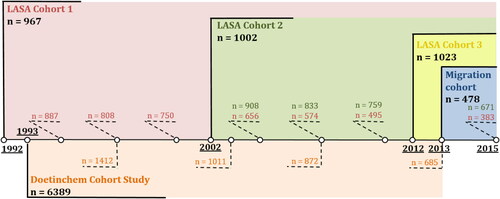Figures & data
Figure 1. Schematic timeline of different (birth) cohort populations. The longitudinal Doetinchem Cohort (shown in orange, n = 1412) measured general mental health inventory from baseline measurements in 1993–1997 with follow-up measurements every 5 years (dotted lines with adjusted n per follow-up measurement). The Longitudinal Aging Study (LASA) has two longitudinal birth cohorts with baseline measurements in 1992/1993 (LASA cohort 1, shown in red, n = 967) and 2002/2003 (LASA cohort 2, shown in green, n = 1002) both with follow-up measurements every 3–4 years. LASA has two additional cross-sectional cohorts, a Dutch cohort with measurements in 2012/2013 (LASA cohort 3, shown in yellow, n = 1023) and a Turkish/Moroccan cohort with measurements in 2013 (Migration cohort, show in blue, n = 478).

Table 1. Baseline characteristics for men and women of the different (birth) cohort populations.
Table 2. Age-adjusted mean difference in three mental health indicators between women and men in persons of the different (birth) cohort populations.
Figure 2. Longitudinal course of three indicators of mental health by age and sex in older adults. (A) Self-reported general mental health inventory measured by the MHI-5 questionnaire by age for men and women of the Doetinchem Cohort Study (DCS) aged 55–64 years at baseline measurements in 1995/1998. (B) Self-reported depressive symptoms measured by the CES-D questionnaire and (C) anxiety symptoms measured by the HADS-A questionnaire by age for men and women of the Longitudinal Aging Study Amsterdam (LASA) cohort 1 with baseline measurements in 1992/1993 (solid lines) and LASA cohort 2 with baseline measurements in 2002/2003 (dotted lines) aged 55–65 years at baseline. Lines depict results of statistical models.

Table 3. Multivariable model of the longitudinal course of the sex difference in three different mental health indicators by age.
Data availability statement
Data cannot be shared publicly because of confidentiality. Data are available from the LASA Institutional Data Access/Ethics Committee (contact via https://www.lasa-vu.nl/index.htm) for researchers who meet the criteria for access to confidential data. The LASA Steering Group will review all requests for data to ensure that proposals for the use of LASA data do not violate privacy regulations and are in keeping with informed consent that is provided by all LASA participants. The authors of this study do not have any special access privileges to the data underlying this study that other researchers would not have.
